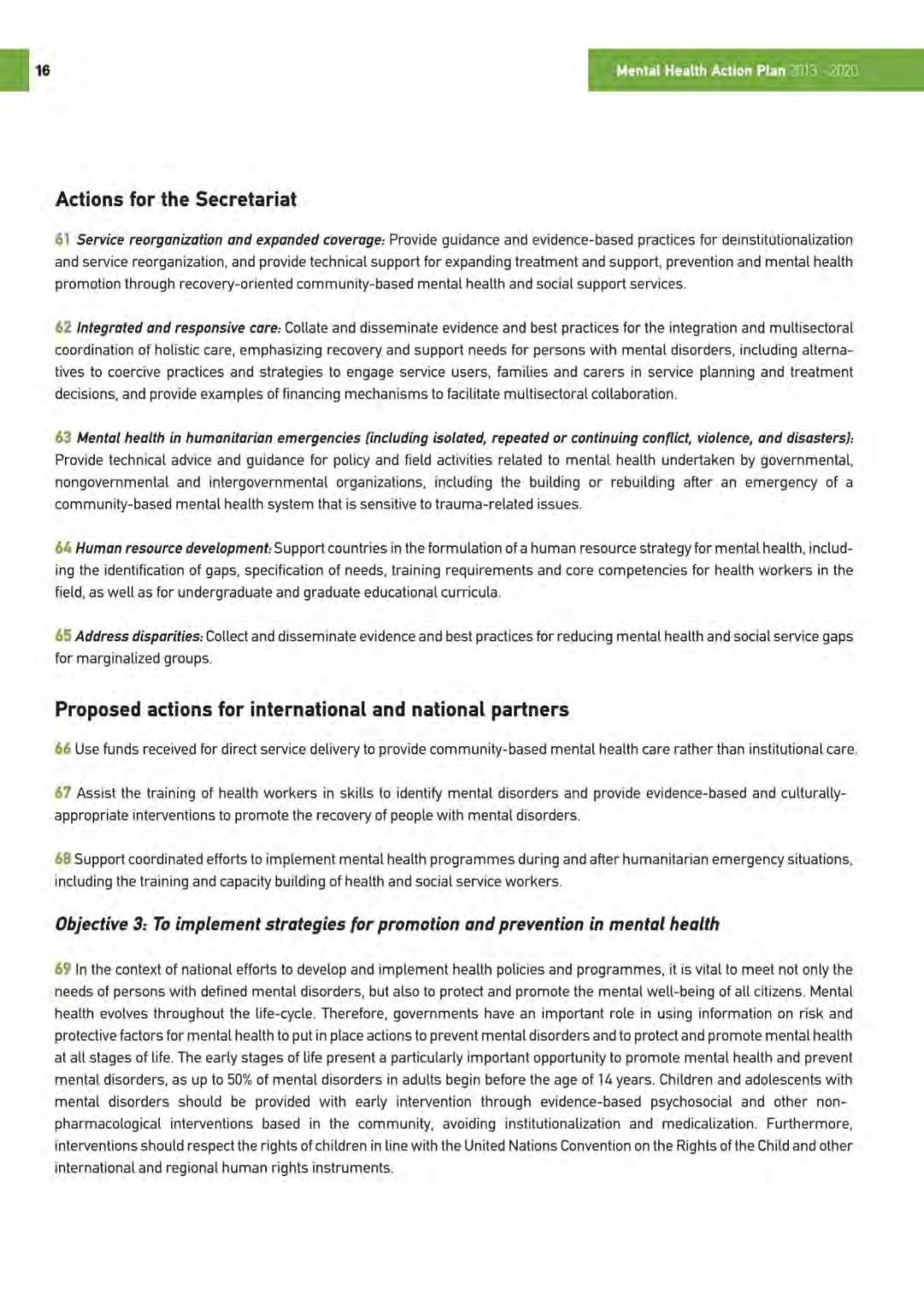正在加载图片...

Mental Heatth Action Plan 2013-2020 Actions for the Secretariat 61 Service reorganization and expanded coverage:Provide guidance and evidence-based practices for deinstitutionalization and service reorganization,and provide technical support for expanding treatment and support,prevention and mental health promotion through recovery-oriented community-based mental health and social support services. 62 Infegrated and responsive care:Collate and disseminate evidence and best practices for the integration and multisectoral coordination of holistic care,emphasizing recovery and support needs for persons with mental disorders,including alterna- tives to coercive practices and strategies to engage service users,families and carers in service planning and treatment decisions,and provide examples of financing mechanisms to facilitate multisectoral collaboration. 63 Mental health in humanitarian emergencies (including isolated,repeated or continuing conflict,violence,and disasters): Provide technical advice and guidance for policy and field activities related to mental health undertaken by governmental, nongovernmental and intergovernmental organizations.including the building or rebuilding after an emergency of a community-based mental health system that is sensitive to trauma-related issues. 64 Human resource development:Support countries in the formulation of a human resource strategy for mental health,includ- ing the identification of gaps,specification of needs,training requirements and core competencies for health workers in the field,as well as for undergraduate and graduate educational curricula. 65 Address disparities:Collect and disseminate evidence and best practices for reducing mental health and social service gaps for marginalized groups. Proposed actions for international and national partners 66 Use funds received for direct service delivery to provide community-based mental health care rather than institutional care. 67 Assist the training of health workers in skills to identify mental disorders and provide evidence-based and culturally- appropriate interventions to promote the recovery of people with mental disorders. 68 Support coordinated efforts to implement mental health programmes during and after humanitarian emergency situations, including the training and capacity building of health and social service workers. Objective 3:To implement strategies for promotion and prevention in mental health 69 In the context of national efforts to develop and implement health policies and programmes,it is vital to meet not only the needs of persons with defined mental disorders,but also to protect and promote the mental well-being of all citizens.Mental health evolves throughout the life-cycle.Therefore,governments have an important role in using information on risk and protective factors for mental health to put in place actions to prevent mental disorders and to protect and promote mental health at all stages of life.The early stages of life present a particularly important opportunity to promote mental health and prevent mental disorders,as up to 50%of mental disorders in adults begin before the age of 14 years.Children and adolescents with mental disorders should be provided with early intervention through evidence-based psychosocial and other non- pharmacological interventions based in the community,avoiding institutionalization and medicalization.Furthermore, interventions should respect the rights of children in line with the United Nations Convention on the Rights of the Child and other international and regional human rights instruments.16 Mental Health Action Plan /1',;, TV~ I Actions for the Secretariat 61 Service reorganization and expanded coverage: Provide guidance and evidence-based practices for deinstitulionalization and service reorganization, and provide technical support for expanding treatment and support, prevention and menial health promotion through recovery-oriented community-based mental health and social support services. 62 Integrated and responsive care: Collate and disseminate evidence and best practices for the integration and multisectoral coordination of holistic care, emphasizing recovery and support needs for persons with menial disorders, including alternatives to coercive practices and strategies to engage service users, families and carers in service planning and treatment decisions, and provide examples of financing mechanisms to facilitate multisectoral collaboration. 63 Mental health in humanitarian emergencies (including isolated, repeated or continuing conflict, violence, and disasters): Provide technical advice and guidance for policy and field activities related to mental health undertaken by governmental. nongovernmental and intergovernmental organizations, including the building or rebuilding after an emergency of a community-based mental health system that is sensitive to trauma-related issues. 64 Human resource development: Support countries in the form ulation 01 a human resource strategy for mental health, including the identification of gaps, specification of needs, training requirements and core competencies for health workers in the field, as well as for undergraduate and graduate educational curricula. 65 Address disparities: Collect and disseminate evidence and best practices for reducing mental health and social service gaps for marginalized groups. Proposed actions for international and national partners 66 Use funds received lor direct service delivery to provide community-based mental health care rather than institutional care. 67 Assist the training of health workers in skills to identify mental disorders and provide evidence-based and culturallyappropriate interventions to promote the recovery of people with mental disorders. 68 Support coordinated efforts to implement mental health programmes during and after humanitarian emergency situations. including the training and capacity building of health and social service workers. Objective 3: To implement strategies for promotion and prevention in mental health 69 In lhe context of nationaL efforts to develop and implement health policies and programmes, it is vital to meet not onLy the needs of persons with defined mental disorders, but also to protect and promote the mental well-being of alL citizens. Mental health evoLves throughout the life-cycle. Therefore, governments have an important role in using information on risk and protective factors for mentaL health to put in place actions to prevent mental disorders and to protect and promote mental health at all stages of life. The early stages of life present a partiCUlarly important opportunity 10 promote mental health and prevent menial disorders, as up to 50% of mental disorders in adults begin before the age of 14 years. Children and adolescents with m enial disorders should be provided with early intervention th rough evidence-based psychosocial and other nonpharmacological interventions based in the community, avoiding institutionalization and medicalizalion. Furthermore. interventions should respect the rights of children in line with the United Nations Convention on the Rights of the ChiLd and other international and regional human rights instruments